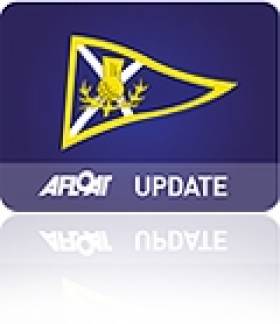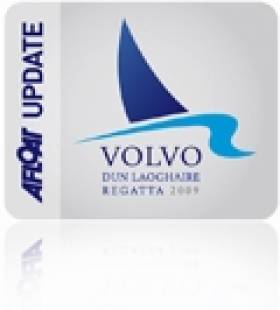Displaying items by tag: Brewin Dolphin
Ireland Thankful to Escape Favourites Tag for Commodore's Cup 2012
Ireland's 2010 Commodore's Cup winning captain showed his relief at the news that Hong Kong have been tipped as favourites for next July's event, The Irish Times reports.
The announcement was made this week at the Royal Ocean Racing Club (RORC) in London, and should lift a burden off an Irish squad which has long suffered under the weight of being pre-event favourites.
Ireland's concerns instead have turned to whether a team can even be assembled for next summer's event in light of the difficult economic environment - and despite the RORC opening the rating bands to allow for more flexible combinations of boat sizes.
As previously reported on Afloat.ie, the Irish Cruiser Racing Association (ICRA) is seeking expressions of interest to form an Irish team and remains hopeful of mounting a serious defence of the title won by last year's Anthony O’Leary-captained squad.
The next Commodore's Cup - which also has a new title sponsor in Brewin Dolphin - takes place from 21 to 28 July 2012 in Cowes.
After triumphing twice, back to back in 2001 and 2002, Mackay becomes only the second skipper or helm to win the overall top trophy three times in the 36 year history of the regatta.
Steering Humberside father and son duo Jim and Steve Dick's J97 Jackaroo, Mackay and crew scored no worse than second and won four times over their six races which were sailed in predominantly strong winds over the four day series. They finished nine points clear of an identical J97, Jaywalker, owned and steered by Clyde helm Iain Laidlaw.
"I have never been up here before but I will certainly be back. It has been such a fun, friendly regatta and winning overall just adds to it. Hamish and the crew have done us a great job. We only got the boat last year and have been learning about it all the time," commented Jackaroo's owner Jim Dick.
"I loved the sailing and the social side of it, it has been just wonderful. Seeing the boat go well and having fun at the same time has been a really good combination. The sailing is hosted in such a fantastic, beautiful location. I am half Scot myself with a father from Anstruther where my uncle had a shoe repair shop."
Dick, who retired four years ago, started and runs a charity in Hull, Cat Zero, which provides sail training and experience for young people who are unemployed.
"It is always a surprise to win. All you can do is win your class and get yourself on to the short list and see what happens. The Class 1 boat Tokoloshe put together a good series but all we could do was win our own fleet. The boat is excellent and we had some excellent people on the boat and that really made the difference. I don't think I can really remember when it was last it was as windy here as it was over the weekend, certainly not racing in a consistent 35 knots, but I was surprised that the race officers started us but I was pleased they did, did a good job getting us going," said Mackay, past chairman of the Royal Yachting Association in Scotland and former Olympic trialist.
"Every year is challenging. Today faired typically difficult Tarbert conditions, with the breezes coming down off the land. So we were keen to be on top of it today and to get two firsts to get ourselves on the short list, which we did. So we are all very pleased. It is a premier regatta, I'm happy we did it."
After a weekend of very testing strong winds today, Monday, Loch Fyne delivered crews a final reminder of how good conditions can be for the north of Britain's premier annual regatta.
Though there was still a chill in the air and the very early morning was punctuated by a heavy hail storm, the sun shone through both races which were completed and the moderate westerly breezes averaged 12 knots but varied from 7-18 knots up and down the three course areas set.
The Jackaroo crew, Mackay, Peter Cameron, George Purves, Billy Russell Jr, Jon Fitzgerald and Roddy Anderson, all native Scots, along with owner Dick, were pushed hard in the overall decision for the 107 boat regatta's top trophy. South African Mike Bartholomew and his team on the King 40 Tokoloshe overcame the challenge from double Scottish Series winner Anthony O'Leary to win IRC Class 1. In CYCA Class 7 Valhalla of Ashton, a Gourock based Swan 36 of Alan Dunnet, won overall with three first places and two second place finishes.
The Class 1 title was down to a duel between rivals Antix and Tokoloshe. The South African flagged boat, on owner Mike Bartholomew's first visit to Loch Fyne had a one point lead to protect ahead of Anthony O'Leary's Irish crew across today's two races. The first contest started with an immediate dilemma for the Series leaders. Antix crossed the start line early and had to restart.But Tokoloshe's tactician Mike Richards may be from the very south of England but has enough experience of Loch Fyne to know to stick close to your rival rather than try to go off and win the race. That proved crucial as they were able to stay close enough to Antix to ensure they had the better of them in the first race and then secured the class title by winning the final race by 16 seconds ahead of the Cork crew on Antix.
Irish Sea Events Offer Entry Discounts
"The way this works is that the Clyde Cruising Club are offering a 25% rebate for boats from the 4 Dun Laoghaire Clubs (DMYC, NYC, RIYC, RStGYC) that enter the Brewin Dolphin Scottish series before the expiration of the early bird discount period which expires on April 22nd explained Dun Laoghaire event secretary, Ciara Dowling.
As a reciprocal arrangement the committee of the Volvo Dun Laoghaire Regatta are offering a discount of 50% from the full entry fee to all boats that enter both regattas. To avail of this, boats must register for the early bird entry fee in the Volvo Dun Laoghaire Regatta prior to 2 May 2011. Note the 50% discount will be applied to the full entry fee rate and not the early bird rate.
To avail of this arrangement for the Scottish Series contact the Brewin Dolphin Scottish Series office for details, [email protected] 0044141 221 2774.
To avail of this arrangement for the Volvo Dun Laoghaire regatta visit the event website at www.dlregatta.org or email [email protected]
The Scottish Series takes place from 27–30 May and the Dun Laoghaire regatta from July 7th–10th 2011.
In a further boost for Dun Laoghaire sailors heading north the feeder race from Bangor to Tarbert has been re-instated.
Troon and Largs Marinas are offering competitors berthing rate discounts around Scottish Series.
Competitors from Scotland coming to Dun Laoghaire are reminded that the entry fee to the regatta includes free berthing for the duration of the event.
The official Notice of Race and Online Entry are now available at www.dlregatta.org


























































